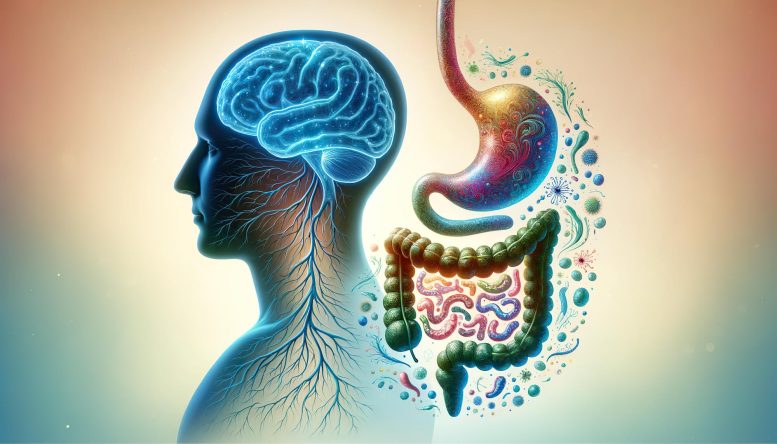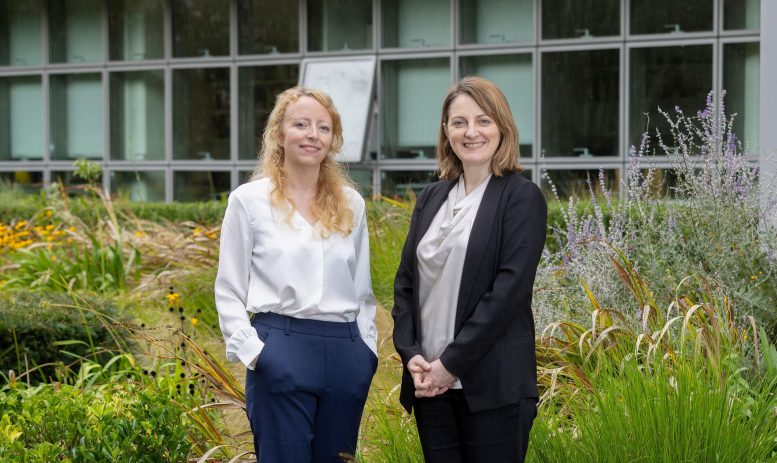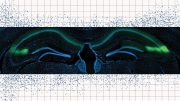
A groundbreaking study has established that Alzheimer’s symptoms can be instigated in healthy animals through the transfer of gut microbiota, underscoring the gut-brain connection and opening new avenues for early treatment and personalized interventions for the disease.
Researchers have discovered the link between the gut microbiota and Alzheimer’s disease.
For the first time, a study has demonstrated that Alzheimer’s symptoms can be transmitted to a healthy young organism through the gut microbiota, confirming its role in the disease.
The research was led by Professor Yvonne Nolan, APC Microbiome Ireland, a world-leading SFI-funded research center based at University College Cork (UCC), and the Department of Anatomy and Neuroscience, UCC, with Professor Sandrine Thuret at King’s College London and Dr Annamaria Cattaneo IRCCS Fatebenefratelli, Italy.

Scientists discover links between Alzheimer’s disease and gut microbiota. Pictured are Dr Stefanie Grabrucker and Professor Yvonne Nolan. Credit: UGC
The study supports the emergence of the gut microbiome as a key target for investigation in Alzheimer’s disease due to its particular susceptibility to lifestyle and environmental influences.
Published in Brain, the study shows that the memory impairments in people with Alzheimer’s could be transferred to young animals through transplant of gut microbiota.
Alzheimer’s Disease, Memory Impairment, and the Gut Microbiome
Alzheimer’s patients had a higher abundance of inflammation-promoting bacteria in fecal samples, and these changes were directly associated with their cognitive status.
Professor Yvonne Nolan said: “The memory tests we investigated rely on the growth of new nerve cells in the hippocampus region of the brain. We saw that animals with gut bacteria from people with Alzheimer’s produced fewer new nerve cells and had impaired memory.”
“People with Alzheimer’s are typically diagnosed at or after the onset of cognitive symptoms, which may be too late, at least for current therapeutic approaches. Understanding the role of gut microbes during prodromal – or early stage- dementia, before the potential onset of symptoms may open avenues for new therapy development, or even individualized intervention,” said Professor Nolan.
Impact on Treatment Strategies and Research Collaborations
Alzheimer’s is the most common cause of dementia, a general term for memory loss and other cognitive abilities serious enough to interfere with daily life. As our population ages, one in three people born today are likely to develop Alzheimer’s. Funded by Science Foundation Ireland, scientists in UCC are working to develop strategies to promote healthy brain aging and advance treatments for Alzheimer’s by exploring how the gut microbiota responds to lifestyle influences like diet and exercise.
Professor Sandrine Thuret, Professor of Neuroscience at King’s College London and one of the study’s senior authors said, “Alzheimer’s is an insidious condition that there is yet no effective treatment for. This study represents an important step forward in our understanding of the disease, confirming that the makeup of our gut microbiota has a causal role in the development of the disease. This collaborative research has laid the groundwork for future research into this area, and my hope is that it will lead to potential advances in therapeutic interventions.”
Professor. John F. Cryan, UCC Vice President for Research and Innovation, who was also involved in this research said: “I’m delighted to be involved in this exciting study that further enhances our understanding of the significant role played by the gut microbiome in brain-related diseases, such as Alzheimer’s, and recognizes UCC and APC Microbiome Ireland as leading institutions in the microbiome and brain health research. This research aligns with our UCC Futures Framework and the strategic plan for the University in the areas of Food, Microbiome, and Health and the soon-to-be-launched Future Ageing and Brain Science.”
Reference: “Microbiota from Alzheimer’s patients induce deficits in cognition and hippocampal neurogenesis” by Stefanie Grabrucker, Moira Marizzoni, Edina Silajdžić, Nicola Lopizzo, Elisa Mombelli, Sarah Nicolas, Sebastian Dohm-Hansen, Catia Scassellati, Davide Vito Moretti, Melissa Rosa, Karina Hoffmann, John F Cryan, Olivia F O’Leary, Jane A English, Aonghus Lavelle, Cora O’Neill, Sandrine Thuret, Annamaria Cattaneo and Yvonne M Nolan, 18 October 2023, Brain.
DOI: 10.1093/brain/awad303
The research was conducted by Dr. Stefanie Grabrucker, a postdoctoral researcher working with Professor Nolan, in partnership with postdoctoral colleagues Dr. Edina Silajdzic at King’s College London and Dr. Moira Marizzoni, IRCCS Fatebenefratelli, Italy. UCC collaborators were Professor Cora O’Neill, Dr. Olivia O’Leary, Dr. Sarah Nicolas, Dr. Jane English, Mr. Sebastian Dohm-Hansen, and Dr. Aonghus Lavelle.








While I don’t have the education, skills or resources to perform laboratory experiments on human and rodent microbiota, I do have a family and personal history of food allergies, US FDA approved food poisoning and dementia and have been writing of those connections for more than a decade, beginning with a “letter” to JACI and a “correspondence” to The Lancet in 2011, neither published. The two were sparked by the at-home late 2010 diet, pH (saliva and/or urine) and nutritional supplement experimentation discovery of my own serious medically undiagnosed calcium deficiency accompanied with chronic fatigue, generalized discomforts and mood swings and ‘temporary’ short-term memory problems. I now postulate the gut microbiome is symptomatic in the human donors and causal in the rodents.
There is a Dr who is a heart specialist but decided to investigate the Microbiome of the gut and he gives such a lot of information, too much to mention here, about the relationship between the gut and the brain. He has many tube sessions himself plus he is a guest speaker on many more. His name is William Davis. Try inputting William Davis – BowelsGone Wild then you can get links to other research he has done. Hope this helps some people as it has helped me. It’s fasinating learning. He particularly talks about a Microbiome called L.Reuteri.
I’ll like to know more on which foods can help and the ones that must be avoided in alzheimers disease